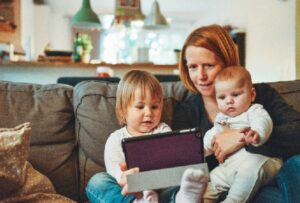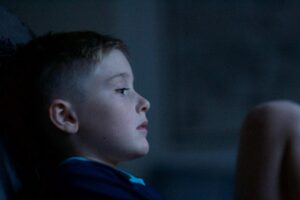The latest Good Childhood Report reveals widespread unhappiness among children, with the ongoing cost-of-living crisis having a marked impact on their wellbeing.
 This is the twelfth annual report published by The Children’s Society into the wellbeing of children and young people across the UK.
This is the twelfth annual report published by The Children’s Society into the wellbeing of children and young people across the UK.
The charity says that this year’s report reveals that too many children are unhappy with their lives and that this is simply “unacceptable.”
Among the key findings from the Good Childhood Report 2023 are the fact that 10% of the more-than-2000 children aged 10 to 17 who completed the household survey during May and June of this year reported low wellbeing. In addition, almost a third (30%) of the young respondents were unhappy with at least one specific area of their lives, and nearly 1 in 10 (9%) were unhappy with four or more.
Other key findings from this year’s Good Childhood Report include that more children aged 10 to 17 were unhappy with school (14.5%). This is a larger proportion than for the other nine aspects of life that the report looks at.
And, while the majority (74%) felt positive about their own futures, less than 4 in 10 children felt positive about the future of the country (38%) and the world (36%).
Good Childhood Report reveals impact of cost-of-living crisis on children
 The report also revealed that the ongoing cost-of-living crisis in the UK is impacting children and young people, and affecting how they feel now and about their future.
The report also revealed that the ongoing cost-of-living crisis in the UK is impacting children and young people, and affecting how they feel now and about their future.
Children responding to the survey who said they were worried about how much money their family had were more likely to be generally unhappy with all the different aspects of life that they were questioned about, compared to children who did not mention financial worries. Those who were concerned about family finances were particularly likely to be unhappy with their home, money and things they own, and the amount of choice they have.
When children were asked about societal issues, rising prices ranked as the top worry among children, followed by the environment.
In addition, when the children were asked about a list of seven issues relevant for their futures, most of the young respondents were worried about having enough money, followed by finding a job and getting good grades at school.
This was mirrored among parents and carers, with 4 in 5 (82%) of those surveyed being concerned about how the cost-of-living crisis was impacting their family or household.
Good Childhood Report: children significantly less happy than a decade ago
 The Good Childhood Report also asked older children and young people how they felt about their safety in different situations.
The Good Childhood Report also asked older children and young people how they felt about their safety in different situations.
The majority of children agreed that they felt safe in six out of seven situations discussed, with the exception being ‘when out in their local area at night.’ Perhaps unsurprisingly, girls were more likely to disagree that they felt safe in this situation. Children and young people with general low wellbeing and those who felt their family was not financially secure were also more likely to feel unsafe in this situation, as well as when being outside of their local area.
As well as its own annual household survey, the Good Childhood Report draws upon data from Understanding Society, a longitudinal representative survey of thousands of households in the UK. It asks children aged 10 to 15 how they feel about family, friends, their appearance, school, schoolwork and their life as a whole.
Analysis from Understanding Society data shows that average happiness scores for all but one of these aspects were lower in 2020-21 than they were when the survey first began in 2009-10. Family was the only area for which average happiness scores remained relatively stable.
Children responding to the Understanding Society survey tended to be least happy with their appearance. Girls in particular were significantly less happy with their appearance than boys, which has always been the case with the survey findings. Girls’ average happiness scores for each of the six measures had also declined significantly, however, raising concerns. The Children’s Society is now calling for further research into girls’ wellbeing.
The Children’s Society says:
“The current generation of children and young people is growing up at a time of unprecedented turbulence and uncertainty.
“As society tries to recover from the impacts of the Covid-19 pandemic, there have been numerous crises in the UK and internationally, notably steep increases to the cost of living, and the climate emergency remains a concern for many young people.”
Recommendations from the Good Childhood Report
In his foreword to the Good Childhood Report, the charity’s Chief Executive, Mark Russell, also explains:
“Time and time again, when we ask children what needs to change to improve their lives, they tell us simply that they want to feel supported and listened to. This is not too much to ask.
“Children and young people need a cohesive, responsive and compassionate system of support around them which aims to prevent their wellbeing from declining, alongside a co-designed and fully funded national strategy for a good childhood.”
The Good Childhood Report outlines 6 key priorities to help improve the wellbeing of children and young people in the UK. These are:
- Protecting children from the rising cost of living by renewing investment in social security for children through an increase to child benefits. The Children’s Society recommends that, as a minimum, increases should be targeted at “families facing the brunt of price rises by uplifting the child element of Universal Credit and Child Tax Credit and removing the two-child limit.”
- Standing up for children to build hope and security for their futures by creating Cabinet-level posts of Minister for Children in both the UK and Welsh Governments to share children’s views at the highest level of political decision-making and champion children’s needs across all government departments.
- Creating a system that starts with prevention by understanding how children are doing. The Government should measure children’s subjective wellbeing at least annually and on a much larger national scale across England and Wales. Currently, surveys undertaken by both The Children’s Society and Understanding Society are completed at home, meaning they cannot capture the experiences of all groups of children, such as those who live in residential care or secure units. The surveys are also limited by small sample sizes.
- Taking responsibility for girls’ unhappiness by commissioning research without further delay. The Government needs to understand why young people, and especially girls, are more unhappy with their appearance, so that effective action can be taken.
- Enabling schools to support pupils’ wellbeing by expanding mental health support teams (MHSTs) to all schools with long-term funding. DHSC and DfE must make sure that no child in England goes without mental health and wellbeing support at school.
- Responding to the needs of parents, carers, and families by working with the voluntary and community sector. DHSC should pilot innovative parent and carer mental health and wellbeing support offers. These could work in partnership with MHSTs and family hubs, once available in all areas.
You can read and download the full Good Childhood Report online.
Protect every childhood
 The Children’s Society is campaigning to protect every childhood by ensuring that child wellbeing is at the heart of the government’s agenda. Their current campaigns also include protecting children through the cost-of-living crisis and getting early mental health support for young people.
The Children’s Society is campaigning to protect every childhood by ensuring that child wellbeing is at the heart of the government’s agenda. Their current campaigns also include protecting children through the cost-of-living crisis and getting early mental health support for young people.
The charity says simply: “No child should suffer without support. Every child deserves a good childhood with access to the help they need. There is going to be a brighter future at the end of it hopefully.”
First Response Training (FRT) is a leading national training provider delivering courses in subjects such as health and safety, first aid, fire safety, manual handling, food hygiene, mental health, health and social care, safeguarding and more.
They work with a large number of early years and childcare providers, as well as schools, colleges, universities and children’s services.
Their courses include Understanding Mental Health, Youth Mental Health First Aid, Anxiety Awareness and Self-Harm Awareness.
A trainer from FRT says:
“We know that young people are really struggling right now. Research suggests that more young people are expressing low wellbeing and mental health struggles through self-harming behaviours, at a time when they have been faced with isolation, loneliness, academic upheaval and other difficulties. This is extremely worrying.
“It’s vitally important that anyone who works closely with children and young people has an understanding of mental health and wellbeing, is able to spot the signs that someone may be struggling and can offer appropriate support.
“Focused training can help with this, ensuring people can provide early help and support and help to protect every childhood, as urged in the Good Childhood Report 2023.”
A brief summary of our mental health training can now be downloaded as an infographic.
You can also download our free Guide to Mental Health Training from our website.
For more information on the training that FRT can provide, please call them today on freephone 0800 310 2300 or send an e-mail to info@firstresponsetraining.com.
